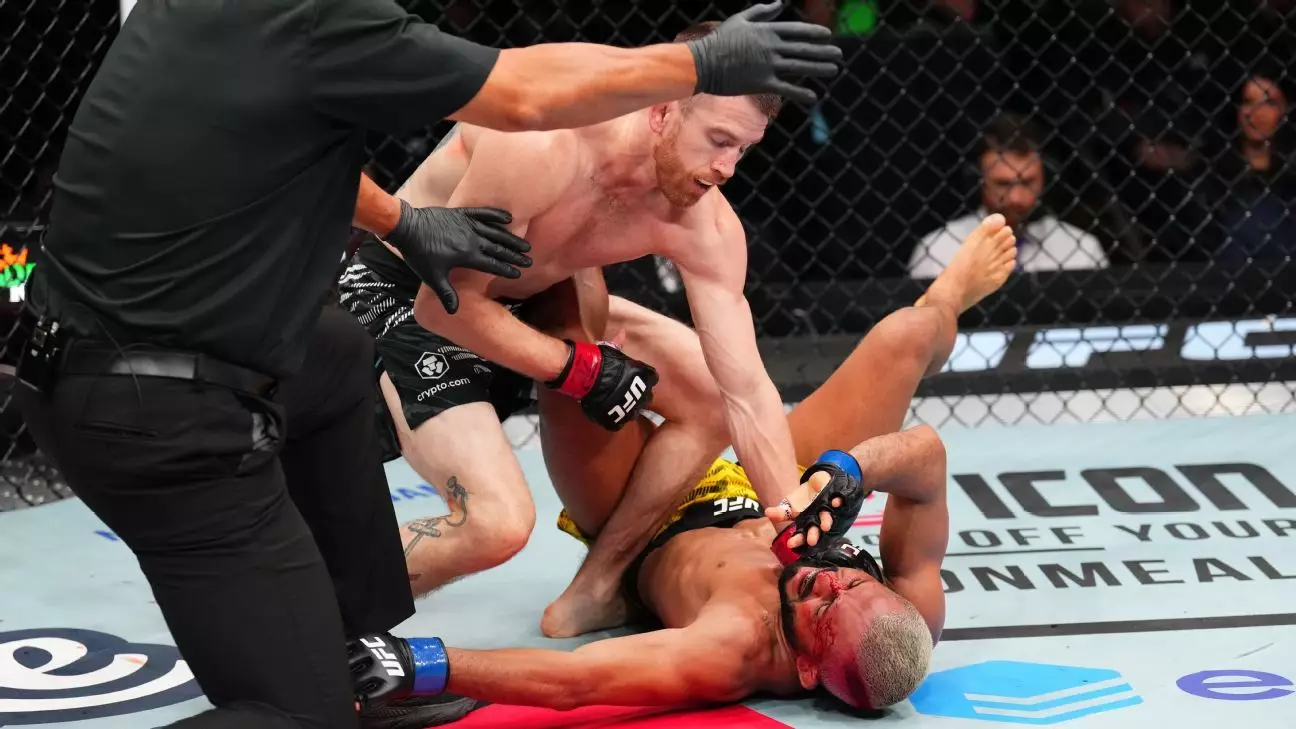Cory Sandhagen’s recent victory at UFC Fight Night in Des Moines marked a pivotal moment in his career, transforming potential despair into undeniable triumph. The 33-year-old bantamweight fighter from Aurora, Colorado, delivered an electrifying performance against Deiveson Figueiredo, a former two-time flyweight champion. This match wasn’t just another bout; it was a clear statement of intent from Sandhagen, signaling his determination to reclaim the path to UFC championship gold after a previous setback against Umar Nurmagomedov in a title eliminator. Now, with a decisive finish in the second round, he positions himself strategically for a title challenge.
The bout commenced with Sandhagen showcasing his striking prowess. He dominated the exchanges, landing a staggering 31 significant strikes in the first round compared to Figueiredo’s meager two. The Brazilian seemed trapped in a tactical maze, grappling with both Sandhagen’s skill and his own questionable decision-making. Sandhagen capitalized brilliantly, illustrating what it means to be a calculated fighter, opportunistically exploiting vulnerabilities while maintaining pressure.
Strategic Mastery Over Physical Strength
What stood out during the fight was Sandhagen’s ability to remain calm under pressure while capitalizing on Figueiredo’s miscalculations. The early scramble showcased a critical error from Figueiredo, who attempted a leg lock without sufficient positional control—an oversight that proved catastrophic. With Figueiredo’s arms entangled around Sandhagen’s leg, he seemed more focused on executing a submission than considering his defense. This moment exemplified a classic combat sports lesson: positional dominance outweighs submission attempts when not properly supported.
As the inevitable second round unfolded, Figueiredo’s reuse of leg locks seemed more reckless than strategic. In a fiercely competitive fight where each mistake becomes magnified, Figueiredo fell into an unfortunate trap of his own making. His knee injury, occurring while entangled with Sandhagen, bore testament to the dangers of high-risk maneuvers in the octagon—a reminder that in mixed martial arts, reality often shatters pre-fight narratives about resilience and invincibility. Sandhagen’s response to the unfortunate end of the bout hinted at his psychological acumen; he recognized that failure to execute properly results in injury—both physical and emotionally.
Setting Sights on Championship Glory
Following this victory, Sandhagen articulated a fervent desire to vie for the title against the winner of a pivotal match between Merab Dvalishvili and Sean O’Malley. His dedication to becoming a UFC champion reflects a philosophical commitment to his craft that many aspiring fighters often overlook. Sandhagen, now with a record of 18-5, has come tantalizingly close to seizing the bantamweight throne on previous occasions, including losses to formidable opponents like Petr Yan and Aljamain Sterling.
His capacity to affirm his ambition, even with a recent defeat still fresh in memory, contrasts sharply with the perceived fragility many associate with mixed martial artists. Instead, Sandhagen emerges as a figure of resilience—a fighter willing to endure the grind of competition, unfazed by setbacks. His plea to the UFC to “show how great I am to the whole world” resonates deeply, highlighting both an intense hunger for recognition and an innate belief in his capabilities.
The Ripple Effect of Fights Beyond the Headliner
Moreover, the undercard of this event showcased a poignant narrative too, with middleweight prospect Bo Nickal suffering his first professional loss against Reinier de Ridder. This instance further amplifies the unpredictable nature of MMA, where fighters at all levels experience the bitter taste of defeat. Nickal’s promising trajectory was momentarily halted, but his journey serves as a reminder that setbacks, however harsh, can ultimately contribute to an athlete’s evolution and fortitude.
In a related narrative, strawweight fighter Marina Rodriguez faced a disheartening loss to Gillian Robertson, marking her third consecutive defeat. Rodriguez’s retirement announcement adds an emotional layer to the event, provoking discussions on the pressures and mental toll that professional fighting exacts on athletes—even those once regarded as rising stars.
While Sandhagen seeks to carve his path toward championship success, the expanse of emotions and narratives surrounding him encapsulates the essence of UFC—filled with stories of resilience, ambition, and an unyielding spirit. The sport isn’t merely about the victories; it’s about the collective journey taken by the fighters and how they emerge stronger from both triumph and defeat.

